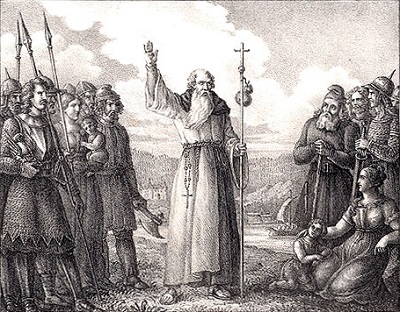This series has five easy 5-minute installments. This first installment: First Missionaries to the Viking Lands.
Introduction
During the Dark Age and the early Medieval Centuries, the Vikings from the Scandinavia realms raided Europe and conquered lands from the Europeans and beyond. They were feared and hated. But all this time they were being changed albeit in a different way.
This selection is from History of Denmark, Sweden, and Norway by Samuel Astley (SA) Dunham published in 1840. For works benefiting from the latest research see the “More information” section at the bottom of these pages.
Samuel Astley (SA) Dunham (1796-1858) was a distinguished British historian.

Public domain image from Wikipedia.
During the reign of Charlemagne, no serious effort was made to establish a permanent mission in Denmark or Sweden. Louis le Debonnair had more zeal or better opportunities; and he readily sanctioned the departure of Ebbo, archbishop of Rheims. Ebbo was a Saxon, and more eager for the conversion of the kindred Danes than any of the French prelates. Encouraged by a papal bull, he ventured on the perilous enterprise in 822. Fortunately for him, Harald, surnamed Klak, who ruled over a portion, at least, of Jutland, had need of imperial aid to secure himself on the throne. As the condition of such aid, he agreed not only to become a vassal of the empire, but to embrace Christianity, and do all in his power to make his subjects embrace it. The court of Harald was near the present city of Sleswic, in the duchy of that name. Ebbo, accompanied by the monk Halitger, proceeded thither, and was permitted by the royal consent to preach to the people. But the fortunes of Harald were diversified; he was expelled three or four times, and as often enabled to return, as much through foreign assistance as through the efforts of his own partisans. That he was unpopular may easily be inferred from these revolutions in his fortunes. Of this unpopularity one cause was doubtless his profession of the new faith; another was the homage which he had paid to the emperor. Yet the efforts made by the kings who reigned in Zealand to create a monarchy, and consequently to destroy the Reguli, who aimed at independence, was, doubtless, more injurious to his interests, than the disaffection of the pagans. But during his intervals of peace, his patronage of Christianity was serviceable to the cause. Ebbo naturally left the country when the king was expelled; and there was danger of the good seed being choked, when another and more zealous missionary was raised by divine Providence both to continue the work which he had begun, and to extend it to Sweden.
Anscar, a monk of Corbey in Westphalia, was from his youth an enthusiastic churchman. He had dreams and visions, which to him seemed prophetic of his future martyrdom. For that result he accordingly prepared; and soon loved to contemplate it as an object of desire rather than of fear. When, therefore, he heard that missionaries were required to continue the labour which Ebbo had abandoned, and to return again with Harald into Denmark, he readily offered himself, and was joyfully accepted. The perils, indeed, of the enterprise had no charms for the luxurious ecclesiastics of that age, — men whom the favors of succeeding monarchs had enriched; and Anscar with another monk, Aubert, were the only inmates of the great establishment at Corbey that could be induced to go. Indeed, the community were not a little amazed to witness the self-devotion of these missionaries. Leaving Corbey, the latter repaired into South Jutland. From Harald, however, they received less assistance than they had been led to expect. Knowing his unpopularity, he remained chiefly in a fortress which the emperor had given him. Of Louis, indeed, he was the vassal, not for Jutland merely, which might never acknowledge him, but for the extensive region on the sea-coast, from Holland to Hamburg. Yet he showed little gratitude to his imperial master. He was suspected, — probably with much justice — of favoring the piratical ravages of the Danes on the Frisian coast. However, he outwardly conformed to Christianity, and was the avowed patron of the missionaries, though he left them to struggle with difficulties which he might have done more to remove. But we must make some allowance for the situation in which he was placed. He had been for many years—he was now—at war with other pretenders to the throne; and as these pretenders (the sons of Gudred) were supported by the influence of the pagan chiefs, he had cares which he deemed more urgent than those of religion. In 828 he was signally defeated and compelled to seek refuge within the bounds of the fief which he held of the emperor. Probably Anscar retreated with him; and subsequently returned to his post. But the death of his coadjutor, and the desperate state of Harald’s affairs, convinced him that the time for the conversion of Jutland was not yet come; and he listened to a proposal, made by some Swedish ambassadors to the emperor, of introducing the gospel into that country.
| Master List | Next—> |
More information here and here and below.
 |
Leave a Reply
You must be logged in to post a comment.